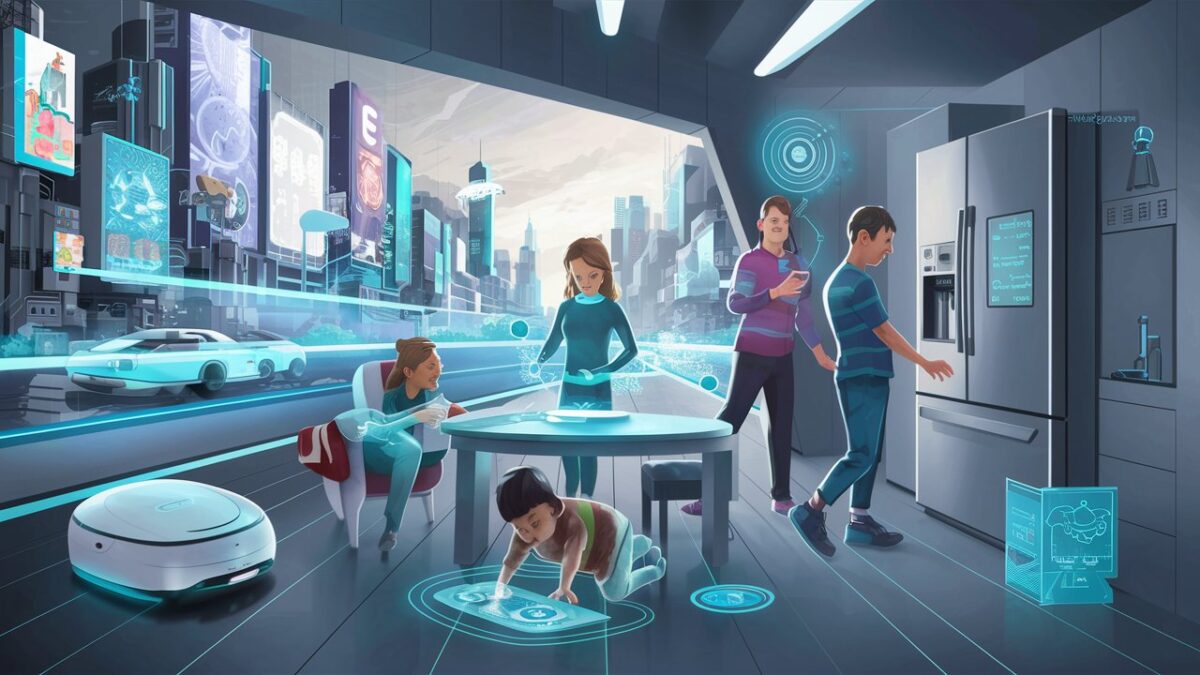Unveiling the Influence of Artificial Intelligence on Daily Living

Artificial intelligence (AI) has transformed science fiction into everyday reality. From the moment we wake up to the second we drift off to sleep, AI invisibly weaves its way through our lives, shaping our experiences in profound ways. This influence, though often subtle, is undeniable. Let’s delve into the multifaceted impact of AI on our daily routines, exploring both the convenience and the challenges it presents.
Efficiency on Autopilot
One of the most noticeable impacts of AI is the boost it provides to our daily efficiency. AI algorithms power the smart assistants embedded in our phones and homes, responding to voice commands, setting reminders, and controlling smart devices. Commute optimization apps utilize real-time traffic data to suggest the fastest routes, saving us precious time. AI-powered email filters prioritize important messages, while spam filters keep our inboxes clutter-free.
The influence of AI extends to the workplace as well. Manufacturing and logistics industries leverage AI for automation, streamlining processes and increasing output. Customer service chatbots answer our questions tirelessly, while AI-powered project management tools boost team collaboration and productivity.
A Personalized Touch
AI personalizes our experiences across various domains. Streaming services recommend movies and shows based on our viewing habits. Social media platforms curate content tailored to our interests, creating a virtual echo chamber of information. Online shopping platforms suggest products based on our purchase history, making the shopping experience more targeted and efficient.
The world of education is also embracing AI. Adaptive learning platforms personalize the learning experience by adjusting the difficulty and pace of lessons to suit each student’s needs. AI-powered tutors provide personalized feedback and support, making education more accessible and engaging.
The Future of Healthcare
The healthcare sector is witnessing a significant transformation driven by AI. Medical imaging analysis utilizes AI to detect abnormalities in X-rays and MRIs with greater accuracy, leading to earlier diagnoses. AI-powered drug discovery is accelerating the development of new treatments, offering hope for patients with chronic illnesses.
AI-powered virtual assistants can monitor patients remotely, identify potential health risks, and provide support and guidance. These advancements hold immense potential to improve healthcare access, personalize treatment plans, and ultimately, save lives.
Safety and Security
Security systems are increasingly incorporating AI for facial recognition, anomaly detection, and real-time threat identification. AI-powered fraud detection systems monitor financial transactions for suspicious activity, protecting us from cybercrime. Self-driving cars utilize AI algorithms to navigate roads safely and efficiently, potentially revolutionizing transportation and reducing traffic accidents.
The Two Sides of the Coin
While AI offers numerous advantages, it also presents certain challenges. One major concern is job displacement. As AI automates tasks previously performed by humans, there’s a risk of unemployment rising in certain sectors. This necessitates a focus on reskilling and upskilling the workforce to adapt to the changing job landscape.
Bias and Fairness
AI algorithms are only as good as the data they are trained on. If the training data is biased, the resulting AI model can perpetuate and amplify those biases. This can lead to unfair outcomes in areas like loan approvals, job applications, and criminal justice. Mitigating bias in AI development and deployment is crucial to ensure fairness and ethical use of this technology.
Privacy Concerns
The widespread use of AI raises concerns about data privacy. As AI systems collect and analyze vast amounts of personal data, it’s essential to have robust regulations in place to protect user privacy and prevent misuse of data.
The Road Ahead
AI is still in its early stages of development, but its impact on our daily lives is undeniable. As AI continues to evolve, we must ensure responsible development and deployment to maximize its benefits and mitigate the potential risks. Open dialogue, collaboration between stakeholders, and a commitment to ethical principles will be key in navigating the exciting yet complex future shaped by AI.
Further Exploration
This section can delve deeper into specific aspects of AI’s impact on everyday life. Here are some potential areas to explore:
- The Future of Transportation: Discuss the ongoing development of self-driving cars, air taxis, and hyperloop technology, and their potential impact on traffic congestion, urban planning, and personal mobility.
- The Rise of Smart Homes: Explore how AI-powered devices are transforming our living spaces, from automated temperature control to intelligent appliances and personalized lighting Our homes are no longer static structures; they are evolving into dynamic environments that anticipate our needs and adapt to our routines. This transformation is driven by the integration of AI and the Internet of Things (IoT) into our living spaces, ushering in the era of the smart home.
A Symphony of Convenience
Imagine a world where your morning alarm seamlessly adjusts the lighting in your bedroom, brewing a fresh pot of coffee while gently warming the bathroom floor. This is a glimpse into the convenience offered by smart homes. Smart thermostats learn your temperature preferences and adjust heating or cooling automatically, optimizing energy consumption and comfort. Smart lighting systems can be controlled remotely or programmed to adapt to natural light, creating a personalized ambiance.
Enhanced Security and Safety
Smart homes offer a new level of security and safety. Smart locks can be controlled remotely, allowing you to grant access to guests even when you’re away. Security cameras equipped with AI can detect unusual activity and send real-time alerts to your smartphone. Leak detectors can identify potential water damage before it becomes a major issue. These features provide peace of mind and help prevent costly mishaps.
Challenges and Considerations
Despite its advantages, the concept of a smart home also presents certain challenges. One major concern is cost. Implementing a comprehensive smart home system can be expensive, with the initial investment for smart devices and installation often acting as a barrier to entry. Security risks are another consideration. As with any internet-connected device, smart home systems are vulnerable to hacking. Ensuring robust cybersecurity measures are in place is crucial to protect your personal data and prevent unauthorized access. Privacy concerns also arise with the collection of data by smart home devices. It’s important to understand how this data is collected, stored, and used to ensure responsible data practices.
The Future of Smart Living
The smart home industry is rapidly evolving. Advancements in AI will enable even more sophisticated interactions between devices and users. Imagine a smart oven that learns your preferred cooking styles or a refrigerator that automatically reorders groceries when supplies run low. Integration with other smart technologies like self-driving cars or smart cities will further enhance the connected living experience.
However, ethical considerations remain paramount. It’s important to strike a balance between convenience and privacy, ensuring user control over data and fostering trust in smart home technology.
Conclusion
The rise of smart homes signifies a paradigm shift in how we interact with our living spaces. AI and IoT are weaving a tapestry of convenience, personalization, and enhanced security into the fabric of our homes. While challenges persist in terms of affordability, security, and privacy, the potential benefits of smart living are undeniable. As the technology matures and becomes more accessible, we can expect a future where our homes become intelligent companions, seamlessly adapting to our needs and enriching our everyday lives.
Frequently Asked Questions About Artificial Intelligence (AI)
1. What is AI?
Artificial intelligence (AI) is a broad field of computer science encompassing a range of techniques that enable machines to mimic or exceed human cognitive abilities. This can include learning from data, solving problems, reasoning, and making decisions. AI encompasses various subfields, from machine learning and natural language processing to computer vision and robotics.
2. How is AI used in everyday life?
AI is already woven into the fabric of our daily lives in numerous ways. Here are a few examples:
- Smartphones: AI powers features like facial recognition for unlocking phones, voice assistants like Siri or Google Assistant, and personalized recommendations on streaming services.
- Transportation: Ride-hailing apps use AI algorithms to optimize routes and match riders with drivers.
- Online Shopping: AI personalizes product recommendations based on your browsing history and purchase patterns.
- Social Media: Social media platforms utilize AI to curate content feeds and identify and filter out harmful content.
- Email Management: Spam filters leverage AI to identify and block unwanted emails.
3. What are the benefits of AI?
AI offers a multitude of benefits, including:
- Increased Efficiency: AI automates tasks, streamlines processes, and helps us get more done in less time.
- Personalized Experiences: AI tailors experiences to individual needs and preferences.
- Improved Decision-Making: AI can analyze vast amounts of data to identify patterns and make data-driven decisions.
- Enhanced Security: AI-powered security systems can detect threats and prevent cybercrime.
- Advancements in Healthcare: AI assists with medical diagnosis, drug discovery, and personalized treatment plans.
4. What are the challenges of AI?
While AI offers numerous advantages, it also presents certain challenges:
- Job displacement: As AI automates tasks, there’s a risk of unemployment rising in certain sectors.
- Bias and Fairness: AI algorithms can perpetuate biases present in the data they are trained on.
- Privacy Concerns: The widespread use of AI raises concerns about data privacy and potential misuse of personal information.
- Safety and Control: Ensuring the safe and responsible development and deployment of AI is crucial.
5. What does the future hold for AI?
AI is a rapidly evolving field with immense potential to revolutionize various aspects of our lives. We can expect to see advancements in areas like:
- Self-driving cars and other autonomous transportation systems.
- AI-powered robots capable of performing complex tasks in various industries.
- Smarter and more personalized experiences across different domains.
- AI-driven healthcare leading to earlier diagnoses, more effective treatments, and personalized medicine.
6. How can we ensure the responsible development of AI?
Ensuring the responsible development of AI requires a multi-pronged approach:
- Ethical considerations should be integrated throughout the design, development, and deployment of AI systems.
- Transparency in how AI algorithms work is crucial to build trust and address potential biases.
- Regulations may be necessary to safeguard privacy and prevent misuse of AI.
- Education and public awareness are essential to foster understanding and responsible use of AI.








